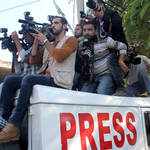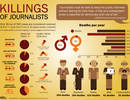From safety of journalists to online privacy
IPDC Council debated most cutting-edge issues in media development field
What is the international community doing to fight crimes against journalists and impunity? What is the status of the judicial inquiries of journalists killed between 2006 and 2013? Are free, independent and pluralistic media a priority in the post-2015 development agenda? What is experience telling us about media development in the world? How can journalism excellence be promoted so that journalists can disseminate quality knowledge for peace, development and democracy around the world? And how can all this be properly and rigorously assessed?
These and many other issues were discussed by the Intergovernmental Council of the International Programme for the Development of Communication (IPDC), which took place in the UNESCO Headquarters (Paris, France) on 20 and 21 November 2014. A special session was devoted to online privacy and freedom of expression, including the right to be forgotten.
In addition to projects supported on an annual basis all over the world, IPDC has also launched a series of the following initiatives aimed at building a knowledge base in strategic areas.
THEMATIC SESSIONS
Safety of Journalism
A report on The safety of journalists and the danger of impunity, providing background information on UNESCO’s work in this area and coversing developments over 2012-2013, was submitted to the 39th session of the IPDC Council. The report also provides a cumulative update of the 593 killings of journalists between 1 January 2006 and 31 December 2013 for which UNESCO’s Director-General requested respective Member States to voluntarily submit information on judicial follow-up. >> More
Assessing Media Development
UNESCO’s IPDC Council meeting discussed developments in the Organization’s standard-setting work around media issues, including a new partnership with Deutsch Welle Akademie on assessing sustainability. Consideration of media viability issues is a gap in the current Media Development Indicator (MDI) framework, and one of growing importance as Internet and mobile telephony continue to challenge traditional models of economically sustainable media. >> More
Online privacy and freedom of expression
The digital revolution is impacting on all spheres of public and private life. More and more personal and public data and information are collected, stored and shared via the Internet. All this brings with it unparalleled opportunities for media development as well as challenges regarding freedom of expression, particularly related to the right to privacy. The IPDC Council hosted, on 20 November, a thematic debate, which will center on freedom of expression and privacy online. >> More
Post-2015 development agenda
Do media matter in the post-2015 development agenda? An emphatic “yes” is the answer to this question. The 39 Member States on the IPDC Council were responding to a brief on how the IPDC Secretariat helped to mobilize international advocacy for the inclusion of free, independent and pluralistic media in any development agenda that postdates the Millennium Development Goals (MDGs). >> More
Photo gallery
UNESCO partnered with online community platform for data visualization, Visual.ly in an infographics competition to raise awareness of the first International Day to End Impunity for Crimes against Journalists (2 November 2014).
>> Click here to see the best infographics submitted to the contest
About IPDC
International Programme for the Development of Communication (IPDC) was set up in 1980 as the only intergovernmental programme in the UN system mandated to mobilize international support in order to contribute to sustainable development, democracy and good governance by strengthening the capacities of free and independent media. Since its creation, IPDC has channeled about US$ 105 million to over 1,700 media development projects in some 140 countries. IPDC’s Council is composed of 39 Member States elected by UNESCO’s General Conference. It meets once every two years to reflect on the latest trends in the media development field and give direction to the Programme.














